北师大版八年级英语下知识要点
北师大版初中英语八年级下册词汇讲解Unit1 Technology and the Future(词汇)

Unit 1 School of the Future词汇精讲精练:词汇精讲1. popular(1)popular作形容词,意为“流行的,受人欢迎的”。
常用短语为be popular with,意为“受……的欢迎”。
例如:The most popular sport is football.最流行的运动是足球。
He is popular with our classmates.他在我们班里有人缘。
(2)popular作形容词,意为“民众的,大众的”。
例如:Popular education is one of our major objectives.民众教育是我们的主要目标之一。
He speaks in popular language.他用通俗的语言讲话。
【拓展】popularity作名词,意为“普及,流行,大众化”。
例如:Golf has gained popularity among the wealthy in my country. 高尔夫球已在我国富有的人中流行起来。
The popularity of p rivate cars is changing the people’s life style.私家车的普及正在改变着人们的生活方式。
2. inventioninvention作可数名词,意为“发明,创作”。
例如:Fax machines were a wonderful invention at the time.传真机在当时是一项了不起的发明。
【拓展】(1)invent 作动词,意为“发明,创造”。
例如:Edison invented the light bulb.爱迪生发明了电灯。
(2)invent还可以表示“虚构”。
例如:The whole story was invented.整个故事是虚构的。
(3)inventor作可数名词,意为“发明家;发明者”。
例如:Edison was a great inventor.爱迪生是一位伟大的发明家。
北师大版初二(下)英语重点语法汇总

初二(下)重点语法汇总Unit1重点语法宾语从句:宾语从句的引导词常常有以下三种:由陈述句转化而来的宾语从句,引导词为that,that 在口语或非正式文体中可省略;由一般疑问句转化而来的宾语从句,引导词为if或whether;由特殊疑问句转化而来的宾语从句,引导词为句子本身的特殊疑问词,即what,when,where 等。
如:I think(that)he will come here by train. 我认为他会坐火车来这儿的。
He asked me if / whether I know his new address. 他问我是否知道他的新地址。
I want to know when you got back home yesterday. 我想知道你昨天什么时候到家的。
语序宾语从句的语序为陈述句语序,即“主语+谓语+宾语+其他”。
也就是说,将疑问句转化成宾语从句时,一定要将疑问句语序转变成陈述句语序。
如:Can you tell me what he will do tomorrow? 你能告诉我他明天将要做什么吗?当疑问句在宾语从句中做主语时,语序不变。
如:Do you know what makes him so excited? 你知道什么事使他如此兴奋吗?I don’t know what is wrong with him. 我不知道他出什么事了。
时态主句为一般现在时态,则宾语从句根据实际情况用任意的时态;但主句为一般过去时态时,宾语从句则要用过去的相对应的某种时态。
例如:She tells me that she will come by bus. 她说她将要坐公交车来。
She told me that she would come by bus. 她说她将要坐公交车来。
如果宾语从句表示的是客观真理或是科学事实,其谓语动词仍用一般现在时态。
如:Our teacher told us that the sun is much bigger than the moon. 老师告诉我们说太阳比月球大得多。
八年级英语下册知识讲义-(Unit3 Lesson 9 Thanksgiving)-北师大版

学习目标1. 掌握重点短语的用法。
2. 辨析agree with,agree on,agree to。
重点:go wrong, be proud of, for a good price, agree with, after all, spend... with。
难点:agree的有关短语。
知识梳理【短语学习】1. go wrong 失败,弄不好,不顺利go wrong 的英语解释be unsuccessful,其近义词为:fail。
Everything went wrong in those days. 当时,事事不顺。
If something should go wrong, the signal lamp would light up. 万一发生什么事故,信号灯就会亮起来。
翻译句子:电梯也可能会出错,让你待在里面出不来。
答案:The elevator may also go wrong and keep you inside.2. be proud of 因……而骄傲be proud of 因……而自豪。
其中proud 为形容词,“自豪的,骄傲的”。
I’m proud of my country. 我为我的国家而骄傲。
take pride in 因……而自豪。
其中pride为名词。
We all take pride in your success. 我们都为你的成功而感动自豪。
—Li Na won the tennis championship in the French Open on June 4, 2011.—We ___________ her. She is the first Asian professional tennis player to win it.A. take pride ofB. be proud ofC. are proud inD. take pride in答案:D思路分析:句意:“李娜在2011年6月4号的法国网球公开赛上赢得了冠军。
最新北师大八年级英语下册知识要点汇总

八年级下units 1-10知识点Unit 1 Will people have robots?1. see sb. do sth. 看见sb.做某事(的全过程);see sb. doing sth. 看见sb.正在做某事(片断)2.没有具体的数目用“hundreds of+名词(复数)”表示“数以百计的”有具体的数目时,用“基数词+hundred+名词(复数)”,hundred后不能有s,也不能用介词 of。
(类似的词还有thousands of; millions of)3.一段时间 + from now (从现在起)…之后; from now on = in the future 今后eg. twenty years from now 今后20年4. 肯定句:I think (that)…. 否定句: I don’t think (that)….一般疑问句:Do you think …? 特殊疑问句:What do you think…..?5. study at home on computer辨析:on,in和with.on:表示使用通讯工具、信息或传媒,乘坐交通工具等;in:使用语言文字等媒介; with:借助具体的手段或工具。
Eg. I don’t want to talk about it on the phone.Can you speak it in English?Don’t write it with a red pen.3. Will people use money in 100 years?“in+时间”结构常与一般将来时连用,对其进行提问时用特殊疑问词how soon.4. before 可用于任何时态 ago 与过去时连用5. fewer people 更少的人(fewer修饰名词复数,表示否定)less free time 更少的空闲时间(less修饰不可数名词,表示否定)6. in ten years 10年后(in的时间短语用于将来时,提问用How soon)7. live alone 单独居住;feel lonely 感到孤独(比较:live alone/go along等)The girl walked alone along the street, but she didn’t feel lonely。
北师大版初中英语八年级下册词汇讲解Unit3 Festivals and Holidays(词汇)

Unit 3 Festivals and Holidays词汇精讲精练:词汇精讲1. luckluck作不可数名词,意为“运气”。
good luck意为“好运”;bad luck意为“倒霉”。
good luck to sb 意为“祝某人好运”。
例如:She wishes me good luck in the exam. 她祝我考试好运。
Good luck to you! 祝你好运!2. wishwish作动词,意为“祝愿,希望”。
“wish sb.+名词”意为“愿某人……,祝某人……”。
例如:I wish you a happy birthday. 我祝你生日快乐。
【拓展】辨析:wish与hope(1)共同点:wish/hope to do sth.意为“希望做某事”。
例如:I wish/hope to buy a bike. 我希望买一辆自行车。
(2)不同点:1)wish sb. to do sth意为“希望某人做某事”,但hope无此用法。
例如:I wish him to go. 我希望他去。
2)wish表示难以实现的“愿望”;hope表示可以实现的“希望”。
例如:I wish to get a car. 我很想得到一辆汽车。
I hope for success. 我希望成功。
3)“wish+that从句”表“愿望”,从句用虚拟语气;“hope+that从句”表“希望”,从句常用一般将来时。
例如:I wish I could fly. 要是我会飞就好了。
I hope you’ll be better soon. 我希望你很快就好起来。
4)wish可跟双宾语,但hope不能。
例如:Wish you success. 祝你成功。
5)“wish sb. +adj.”意为“祝某人……”;但hope不能这样用。
例如:I wish you happy. 我祝你们幸福。
3. millions ofmillions of意为“数百万的……,大量……”。
北师大版-八年级英语下册知识要点

北师大版-八年级英语下册知识要点Unit 1 Will People Have Robots?In this unit。
we learn about the future and how it might look。
We use the structure "see sb。
do sth." to describe seeing someone do something from start to finish。
and "see sb。
doing sth." to describe seeing someone doing something in a specific moment。
We also use "hundreds of + plural ___。
and "number + hundred + ___。
we use "from now" to describe a d of time in the future。
and "from now on" to describe the future in general.When discussing ns。
we use "I think (that)" in affirmative sentences。
"I don't think (that)" in negative sentences。
"Do you think。
" in general ns。
and "What do you think。
" in specific ns。
We also learn about the ns "on," "in," and "with," which are usedto describe different types of media or tools.In the n about money。
北师大版初中英语八年级下册知识讲解Review Unit1-3

Review Units 1-3词句精讲精练:词汇精讲1. popular(1)popular作形容词,意为“流行的,受人欢迎的”。
常用短语为be popular with,意为“受……的欢迎”。
例如:The most popular sport is football.最流行的运动是足球。
He is popular with our classmates.他在我们班里有人缘。
(2)popular作形容词,意为“民众的,大众的”。
例如:Popular education is one of our major objectives.民众教育是我们的主要目标之一。
He speaks in popular language.他用通俗的语言讲话。
【拓展】popularity作名词,意为“普及,流行,大众化”。
例如:Golf has gained popularity among the wealthy in my country. 高尔夫球已在我国富有的人中流行起来。
The popularity of private cars is changing the people’s life style.私家车的普及正在改变着人们的生活方式。
2. compare(1)compare作动词,意为“比较,对照”,常与with连用。
例如:Compare your answers with those at the back of the book to see if they are right.把你的答案同书后面的答案对照一下,看看是否正确。
My handwriting can not be compared with my father’s.我的书法不能与我父亲的相比。
If you compare the two books, you will see that this one is better.如果你比较一下这两本书,你会发现这一本好一些。
八年级英语下册重难点讲解

北师大版八年级英语下册重难点讲解:Unit7 Living Together一. 教学内容:复习Unit 7二. 教学重点:1. 复习一般过去时和过去进行时及区别。
2. 反身代词的用法。
3. 频度副词在一般现在时中的应用。
4. 重点词组解析。
三. 具体内容(一)一般过去时和过去进行时的区别:1. 一般过去时常表示在过去某时发生的动作或存在的状态(包括过去的习惯动作),常与一般过去时连用的时间状语有:just now, a moment ago, yesterday, last week/month/year, the day before yesterday 及表示过去的时间状语从句。
e.g. I met her in the street the day before yesterday.Ex. Hangzhou is a nice city. My dad()me there when I was about ten years old.A. pulled B. caught C. took D. brought2. 过去进行时常用的时间状语有:at that time/moment, at this time yesterday, at +点钟+yesterday, 时间状语从句。
e.g. What were you doing at seven yesterday?Ex. I ()on the computer when Jim came to see me yesterday evening.A. draw B. drew C. was drawing D. am drawing3. 一般过去时往往表示某一动作已经发生,而过去进行时却表示动作在持续。
e.g. She wrote a letter to her friend last night. She was writing a letter to her friend at nine last night.Ex. -Why d idn’t you give me a phone call?-- I ( ) . But nobody answered the phone.A. do B. did C. will D. have注意:下面几种情况不用一般过去时而要用过去进行时:1)表示过去某一阶段正在进行或暂时性的动作。
北师大八年级下册英语
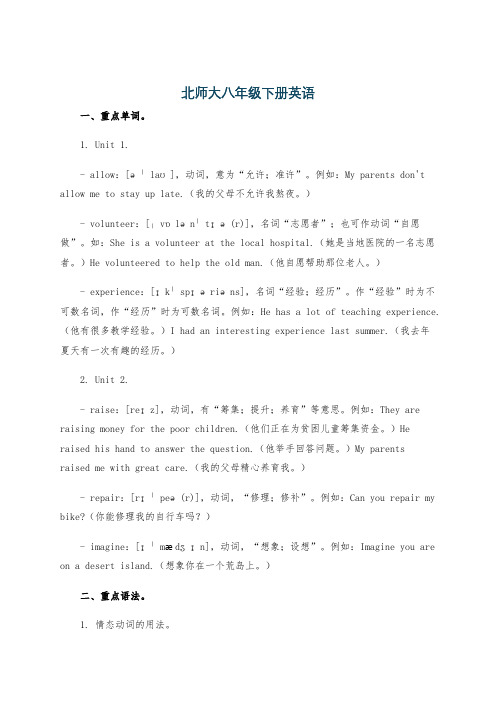
北师大八年级下册英语一、重点单词。
1. Unit 1.- allow:[əˈlaʊ],动词,意为“允许;准许”。
例如:My parents don't allow me to stay up late.(我的父母不允许我熬夜。
)- volunteer:[ˌvɒlənˈtɪə(r)],名词“志愿者”;也可作动词“自愿做”。
如:She is a volunteer at the local hospital.(她是当地医院的一名志愿者。
)He volunteered to help the old man.(他自愿帮助那位老人。
)- experience:[ɪkˈspɪəriəns],名词“经验;经历”。
作“经验”时为不可数名词,作“经历”时为可数名词。
例如:He has a lot of teaching experience.(他有很多教学经验。
)I had an interesting experience last summer.(我去年夏天有一次有趣的经历。
)2. Unit 2.- raise:[reɪz],动词,有“筹集;提升;养育”等意思。
例如:They are raising money for the poor children.(他们正在为贫困儿童筹集资金。
)He raised his hand to answer the question.(他举手回答问题。
)My parents raised me with great care.(我的父母精心养育我。
)- repair:[rɪˈpeə(r)],动词,“修理;修补”。
例如:Can you repair my bike?(你能修理我的自行车吗?)- imagine:[ɪˈmædʒɪn],动词,“想象;设想”。
例如:Imagine you are on a desert island.(想象你在一个荒岛上。
)二、重点语法。
北师大版初二(下)英语重点词汇汇总
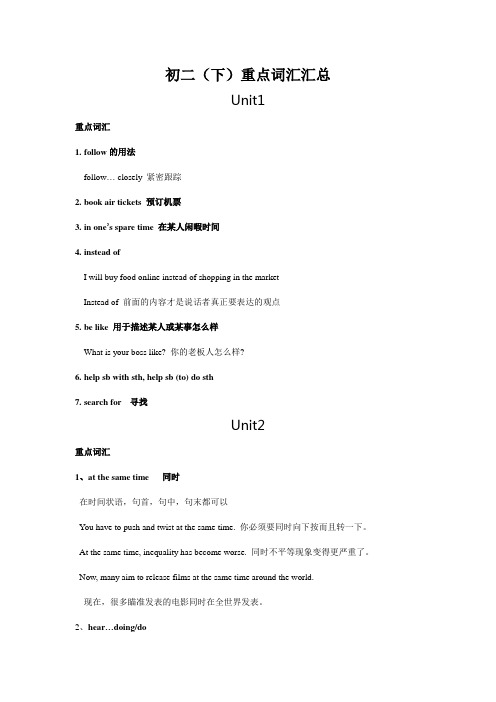
初二(下)重点词汇汇总Unit1重点词汇1.follow的用法follow… closely 紧密跟踪2.book air tickets 预订机票3.in one’s spare time 在某人闲暇时间4.instead ofI will buy food online instead of shopping in the marketInstead of 前面的内容才是说话者真正要表达的观点5.be like 用于描述某人或某事怎么样What is your boss like? 你的老板人怎么样?6.help sb with sth, help sb (to) do sth7.search for 寻找Unit2重点词汇1、at the same time 同时在时间状语,句首,句中,句末都可以You have to push and twist at the same time. 你必须要同时向下按而且转一下。
At the same time, inequality has become worse. 同时不平等现象变得更严重了。
Now, many aim to release films at the same time around the world.现在,很多瞄准发表的电影同时在全世界发表。
2、hear…doing/dohear后既可以接动名词也可以接动词原形。
区别在于被听到的动作是否在进行中。
例如:I can hear him play the piano every day.I heard him playing the piano at 18:00 yesterday evening.3、either…or…不是…就是either...or...意为"或者……或者……;不是……就是……"之意。
表示两者之一,连接句子中两个并列的成分。
例如:When the girl is happy, she either sings or dances. 那个女孩高兴时,不是唱就是跳。
北师大版八年级英语下册Unit4重难点知识总结
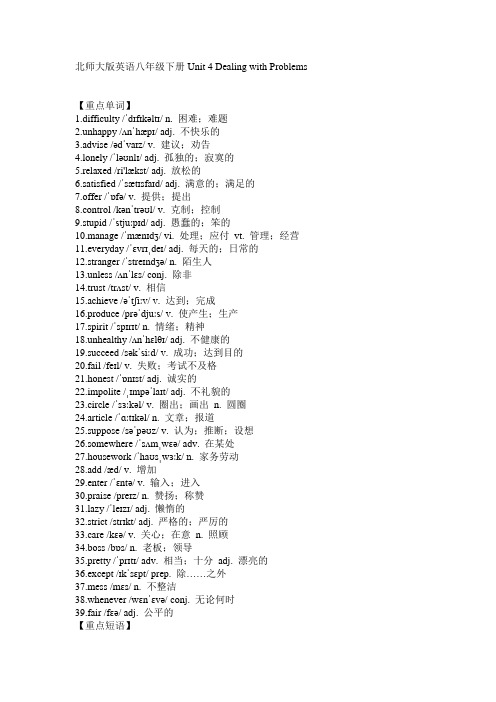
北师大版英语八年级下册Unit 4 Dealing with Problems【重点单词】1.difficulty /ˈdɪfɪkəltɪ/ n. 困难;难题2.unhappy /ʌnˈhæpɪ/ adj. 不快乐的3.advise /ədˈvaɪz/ v. 建议;劝告4.lonely /ˈləʊnlɪ/ adj. 孤独的;寂寞的5.relaxed /ri'lækst/ adj. 放松的6.satisfied /ˈsætɪsfaɪd/ adj. 满意的;满足的7.offer /ˈɒfə/ v. 提供;提出8.control /kənˈtrəʊl/ v. 克制;控制9.stupid /ˈstjuːpɪd/ adj. 愚蠢的;笨的10.manage /ˈmænɪdʒ/ vi. 处理;应付vt. 管理;经营11.everyday /ˈɛvrɪˌdeɪ/ adj. 每天的;日常的12.stranger /ˈstreɪndʒə/ n. 陌生人13.unless /ʌnˈlɛs/ conj. 除非14.trust /trʌst/ v. 相信15.achieve /əˈtʃiːv/ v. 达到;完成16.produce /prəˈdjuːs/ v. 使产生;生产17.spirit /ˈspɪrɪt/ n. 情绪;精神18.unhealthy /ʌnˈhɛlθɪ/ adj. 不健康的19.succeed /səkˈsiːd/ v. 成功;达到目的20.fail /feɪl/ v. 失败;考试不及格21.honest /ˈɒnɪst/ adj. 诚实的22.impolite /ˌɪmpəˈlaɪt/ adj. 不礼貌的23.circle /ˈsɜːkəl/ v. 圈出;画出n. 圆圈24.article /ˈɑːtɪkəl/ n. 文章;报道25.suppose /səˈpəʊz/ v. 认为;推断;设想26.somewhere /ˈsʌmˌwɛə/ adv. 在某处27.housework /ˈhaʊsˌwɜːk/ n. 家务劳动28.add /æd/ v. 增加29.enter /ˈɛntə/ v. 输入;进入30.praise /preɪz/ n. 赞扬;称赞zy /ˈleɪzɪ/ adj. 懒惰的32.strict /strɪkt/ adj. 严格的;严厉的33.care /kɛə/ v. 关心;在意n. 照顾34.boss /bɒs/ n. 老板;领导35.pretty /ˈprɪtɪ/ adv. 相当;十分adj. 漂亮的36.except /ɪkˈsɛpt/ prep. 除……之外37.mess /mɛs/ n. 不整洁38.whenever /wɛnˈɛvə/ conj. 无论何时39.fair /fɛə/ adj. 公平的【重点短语】1.get along with 和……相处2.generation gap 代沟3.on one's own 独自;单独4.care about 关心5.grow up 长大6.from time to time 不时;偶尔7.in low spirits 情绪低落8.break the ice 打破僵局9.turn A into B 把A变成B10.stick to 坚持11.even though 即使;纵然;虽然12.take deep breaths 深呼吸13.bad moods 坏情绪,坏心情14.offer help 提供帮助15.get nervous 变得紧张16.make up with sb 与某人重归就好,与某人和解17.set a time limit 设定时间限制18.cheer oneself up 使自己振作起来19.pay attention to 专心;集中注意力20.all the time 始终,一直21.take exams 考试22.cool down 冷静下来23.at a time 一次;每次24.take a break 休息25.argue with sb about sth 和某人争论某事26.be strict with sb 对某人严格27.set a password 设置密码28.in a mess 一团糟29.get off the phone 挂电话30.have a conversation with sb 和某人谈话31.go wrong 出毛病;发生故障;弄错【重点句型】1.The girl in Photo B seems unhappy. I guess she is having some problems with her friends.照片B中的女孩似乎不高兴。
(修改名词)北师大版八年级英语下册第一章复习提纲

(修改名词)北师大版八年级英语下册第一
章复习提纲
一、词汇复
- 复本章的重要词汇和短语
- 创造不同的句子来运用这些词汇和短语
二、语法复
- 复本章的语法知识点,包括时态、语态、被动语态等
- 练运用这些语法知识点,完成相关的练题
三、听力理解
- 听取本章的录音材料,理解其中的对话和文章内容
- 根据听力内容,完成听力理解题目
四、阅读理解
- 阅读本章的课文和相关阅读材料
- 理解文章的主题、细节以及作者的观点
- 完成相关的阅读理解题目
五、口语练
- 运用本章的词汇、语法等知识点,进行口语练
- 可以与同学进行对话,模拟日常生活中的情景对话
六、写作练
- 运用本章的词汇、语法等知识点,完成写作练
- 写一篇简短的文章,描述一个人或事物,表达自己的观点或故事情节
七、口语演讲
- 准备一个口语演讲,表达自己对本章内容的理解和看法
- 包括主要观点、例子和个人观点的阐述
八、复总结
- 复本章的重点内容和知识点
- 总结自己在研究过程中的不足和有待提高的地方
- 制定合理的复计划,准备下一章的研究
以上是《北师大版八年级英语下册第一章复习提纲》的内容安排。
希望你能认真复习并取得好成绩!。
最新北师大版英语八年级下册知识点汇总
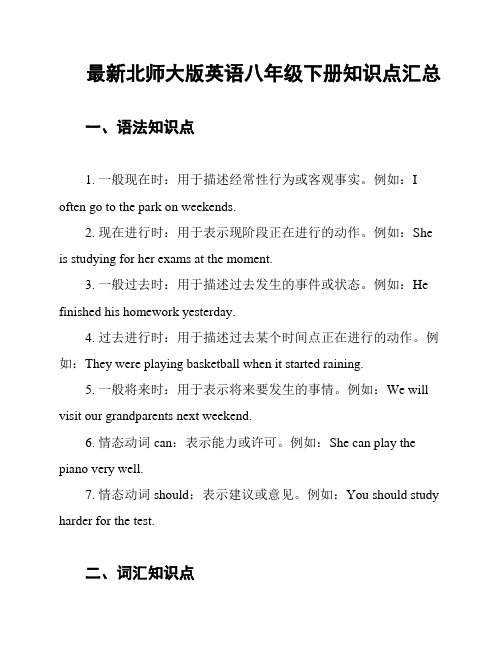
最新北师大版英语八年级下册知识点汇总一、语法知识点1. 一般现在时:用于描述经常性行为或客观事实。
例如:I often go to the park on weekends.2. 现在进行时:用于表示现阶段正在进行的动作。
例如:She is studying for her exams at the moment.3. 一般过去时:用于描述过去发生的事件或状态。
例如:He finished his homework yesterday.4. 过去进行时:用于描述过去某个时间点正在进行的动作。
例如:They were playing basketball when it started raining.5. 一般将来时:用于表示将来要发生的事情。
例如:We will visit our grandparents next weekend.6. 情态动词 can:表示能力或许可。
例如:She can play the piano very well.7. 情态动词 should:表示建议或意见。
例如:You should study harder for the test.二、词汇知识点1. 动物类词汇:例如cat(猫)、dog(狗)、elephant(大象)、tiger(老虎)等。
2. 学科类词汇:例如mathematics(数学)、science(科学)、history(历史)、English(英语)等。
3. 蔬菜类词汇:例如carrot(胡萝卜)、tomato(西红柿)、cabbage(卷心菜)、potato(土豆)等。
4. 家庭类词汇:例如father(父亲)、mother(母亲)、brother(兄弟)、sister(姐妹)等。
5. 地点类词汇:例如park(公园)、school(学校)、hospital (医院)、restaurant(餐厅)等。
三、阅读技巧1. 浏览标题和副标题,了解文章的大致内容。
北师大版初二英语下册第Unit 7知识点

Unit 7Lesson 25 一词组1. on the farm2.in the countryside3. like to do4. mind doing5. like doing6. take a bus7. prefer doing8. enjoy doing 9. love to do10. help sb with sthhelp sb to do sthhelp sb do sth11. feel like doing12. the last time13. hope to do二.动词后接不定1. want to do2. hope to do3. expect to do4. decide to do5. wish to do6. promise to do7. agree to do8. remember to do9. choose to do10. would like to do三. 动词后接ing 形式1. enjoy doing2. finish doing3. feel like doing4. don’t mind doing5. can’t stand doing6. practice doing7. miss doing8. dislike doing四.动词后可接to do / doing 形式。
意思区别不大,有时可通用。
1. like to do / doing2. love to do / doing3. hate to do / doing4. prefer to do / doing5. begin to do / doing6. start to do / doing五. 动名词作宾语通常表示一般倾向,不定式作宾语一般表示特定的或具体的某一次活动。
六. 有些动词后可接to do / doing 形式。
但意思上有区别。
1. stop to do 停下来去做另一件事情stop doing 停止正在的事情eg. Stop talking.别说话了。
8下英语知识点总结北师大
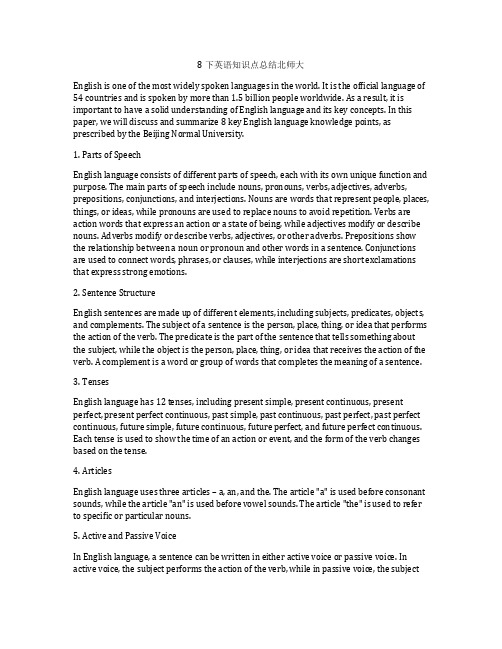
8下英语知识点总结北师大English is one of the most widely spoken languages in the world. It is the official language of 54 countries and is spoken by more than 1.5 billion people worldwide. As a result, it is important to have a solid understanding of English language and its key concepts. In this paper, we will discuss and summarize 8 key English language knowledge points, as prescribed by the Beijing Normal University.1. Parts of SpeechEnglish language consists of different parts of speech, each with its own unique function and purpose. The main parts of speech include nouns, pronouns, verbs, adjectives, adverbs, prepositions, conjunctions, and interjections. Nouns are words that represent people, places, things, or ideas, while pronouns are used to replace nouns to avoid repetition. Verbs are action words that express an action or a state of being, while adjectives modify or describe nouns. Adverbs modify or describe verbs, adjectives, or other adverbs. Prepositions show the relationship between a noun or pronoun and other words in a sentence. Conjunctions are used to connect words, phrases, or clauses, while interjections are short exclamations that express strong emotions.2. Sentence StructureEnglish sentences are made up of different elements, including subjects, predicates, objects, and complements. The subject of a sentence is the person, place, thing, or idea that performs the action of the verb. The predicate is the part of the sentence that tells something about the subject, while the object is the person, place, thing, or idea that receives the action of the verb. A complement is a word or group of words that completes the meaning of a sentence.3. TensesEnglish language has 12 tenses, including present simple, present continuous, present perfect, present perfect continuous, past simple, past continuous, past perfect, past perfect continuous, future simple, future continuous, future perfect, and future perfect continuous. Each tense is used to show the time of an action or event, and the form of the verb changes based on the tense.4. ArticlesEnglish language uses three articles – a, an, and the. The article "a" is used before consonant sounds, while the article "an" is used before vowel sounds. The article "the" is used to refer to specific or particular nouns.5. Active and Passive VoiceIn English language, a sentence can be written in either active voice or passive voice. In active voice, the subject performs the action of the verb, while in passive voice, the subjectreceives the action of the verb. Switching between active and passive voice can change the focus of the sentence and the way information is presented.6. PunctuationPunctuation is used in English language to clarify the meaning of sentences and to indicate pauses and inflections in speech. The main punctuation marks include periods, question marks, exclamation points, commas, colons, semi-colons, apostrophes, quotation marks, and hyphens.7. ConditionalsEnglish language uses different conditional structures to express hypothetical or imaginary situations. There are four main types of conditionals – zero conditionals, first conditionals, second conditionals, and third conditionals. Each conditional structure is used to talk about different kinds of conditions and their possible results.8. Sentence TransformationSentence transformation involves changing the form of a sentence without changing its meaning. This includes changing the tense, voice, or modality of a sentence, as well as making other structural changes to the sentence. Sentence transformation is an important skill in English language, as it allows for greater flexibility and variation in communication.ConclusionIn conclusion, having a solid understanding of these 8 key English language knowledge points is crucial for effective communication and comprehension. By mastering these concepts, learners can improve their language skills and become more proficient in using English in both spoken and written forms. Whether it is understanding the different parts of speech, mastering sentence structure, or learning about tenses and conditionals, these knowledge points form the foundation of English language and are essential for language learners to grasp.。
最新八年级英语下册-1-12单元语法复习要点-北师大版

八年级下units 1-10的复习要点Unit 1 Will people have robots?1. see sb. do sth. 看见sb.做某事(的全过程);see sb. doing sth. 看见sb.正在做某事(片断)2.没有具体的数目用“hundreds of+名词(复数)”表示“数以百计的”有具体的数目时,用“基数词+hundred+名词(复数)”,hundred后不能有s,也不能用介词 of。
(类似的词还有thousands of; millions of)3.一段时间 + from now (从现在起)…之后; from now on = in the future 今后eg. twenty years from now 今后20年4. 肯定句:I think (that)…. 否定句: I don’t think (that)….一般疑问句:Do you think …? 特殊疑问句:What do you think…..?4.study at home on computer辨析:on,in和with.on:表示使用通讯工具、信息或传媒,乘坐交通工具等;in:使用语言文字等媒介; with:借助具体的手段或工具。
Eg. I don’t want to talk about it on the phone.Can you speak it in English?Don’t write it with a red pen.3. Will people use money in 100 years?“in+时间”结构常与一般将来时连用,对其进行提问时用特殊疑问词how soon.4. before 可用于任何时态 ago 与过去时连用5. fewer people 更少的人(fewer修饰名词复数,表示否定)less free time 更少的空闲时间(less修饰不可数名词,表示否定)6. in ten years 10年后(in的时间短语用于将来时,提问用How soon)7. live alone 单独居住;feel lonely 感到孤独(比较:live alone/go along等)The girl walked alone along the street, but she didn’t feel lonely。
八年级英语下:Unit 11 Working with Animals重难点复习北师大版

Unit 11 Woring with Anima一教学内容:复习Unit 11二教学重点:1 复习形容词的比较级和最高级。
2 形容词-ed和-ing的区分。
3 课文重点词组。
三具体内容:(一)形容词比较级和最高级1 大多数形容词都有三个等级的变化:原级,比较级和最高级。
原级即原形;比较级表示“较……”或“更……一些”的意思;最高级表示“最……”的意思。
2 形容词比较级最高级构成的规则变化。
形容词最高级用于三者或三者以上的人或事物的比较,表示在一群人或事物中,其中一个“最……”。
最高级前一般要用定冠词the,句中一般有一个表示比较范围的介词of或in 短语,of 后面一般接表示一群人或事物的代词或名词,in 后面一般接表示一个单位或场所的名词。
to B arrived at C eft D taed in5 I don’t want ou oureveA hurtingB hurtC to hurtD hurtedhave not een her 1991A forB inceC inD about7 He the League for three earA oinedB ha oinedC i inD ha been in8 He ha had the bie two ear agoA forB inceC aboutD \9 Have ou ever _______ to AmericaA goB goneC beenD went10 Everbod ________ He fee ver oneA goB ha goneC have goneD goe。
北师大版八年级英语下知识要点

八年级下units 1-10知识点Unit 1 Will people have robots1. see sb. do sth. 看见sb.做某事(的全过程);see sb. doing sth. 看见sb.正在做某事(片断)2.没有具体的数目用“hundreds of+名词(复数)”表示“数以百计的”有具体的数目时,用“基数词+hundred+名词(复数)”,hundred后不能有s,也不能用介词 of。
(类似的词还有thousands of; millions of)3.一段时间 + from now (从现在起)…之后; from now on = in the future今后eg. twenty years from now 今后20年4. 肯定句:I think (that)…. 否定句: I don’t think (that)….一般疑问句:Do you think …特殊疑问句:What do you think…..5. study at home on computer辨析:on,in和with.on:表示使用通讯工具、信息或传媒,乘坐交通工具等;in:使用语言文字等媒介; with:借助具体的手段或工具。
Eg. I don’t want to talk about it on the phone.Can you speak it in EnglishDon’t write it with a red pen.3. Will people use money in 100 years“in+时间”结构常与一般将来时连用,对其进行提问时用特殊疑问词how soon.4. before 可用于任何时态 ago 与过去时连用5. fewer people 更少的人(fewer修饰名词复数,表示否定)less free time 更少的空闲时间(less修饰不可数名词,表示否定)6. in ten years 10年后(in的时间短语用于将来时,提问用How soon)7. live alone 单独居住;feel lonely 感到孤独(比较:live alone/go along等)The girl walked alone along the street, but she didn’t feel lonely。
北师大版英语八年级下册Unit 3 重难点知识总结

北师大版英语八年级下册Unit 3 Festivals and Holidays【重点单词】1. Thanksgiving /'θæŋks,giviŋ/ n. 感恩节2. dragon /ˈdræɡən/ n. 龙3. firework /ˈfaɪəˌwɜːk/ n. 烟火;烟花4. eve /iːv/ n. 前夕5. decoration /ˌdɛkəˈreɪʃən/ n. 装饰品6. luck /lʌk/ n. 运气7. tofu /ˈtəʊˌfuː/ n. 豆腐8. fry /fraɪ/ v. 油炸9. peace /piːs/ n. 和平10. fact /fækt/ n. 事实;现实11. wish /wiʃ/ v. 祝愿;希望n. 愿望12. midnight /ˈmɪdˌnaɪt/ n. 午夜;子夜13. million /ˈmɪljən/ num. 一百万14. bright /braɪt/ adj. 明亮的;聪明的15. cheer /tʃɪə/ v. 欢呼;喝彩16. picnic /ˈpɪknɪk/ n. 野餐17. bean /biːn/ n. 豆18. biscuit /ˈbɪskɪt/ n. 饼干19. corn /kɔːn/ n. 玉米20. fork /fɔːk/ n. 餐叉21. knife /naɪf/ n. 刀22. plate /pleɪt/ n. 盘子;碟子23. sausage /ˈsɒsɪdʒ/ n. 香肠;腊肠24. spoon /spuːn/ n. 勺;匙25. strawberry /ˈstrɔːbərɪ/ n. 草莓26. remind /rɪˈmaɪnd/ v. 提醒;使想起27. uniform /ˈjuːnɪˌfɔːm/ n. 制服;校服28. gate /ɡeɪt/ n. 大门29. deadline /ˈdɛdˌlaɪn/ n. 最后的期限;截止日期30. turkey /ˈtɜːkɪ/ n. 火鸟;火鸟肉31. pumpkin /ˈpʌmpkɪn/ n. 南瓜;32. pie /paɪ/ n. 馅饼;派33. nearly /ˈnɪəlɪ/ adv. 几乎;差不多34. expect /ɪkˈspɛkt/ v. 期待;预料35. oven /ˈʌvən/ n. 烤箱;烤炉36. heat /hiːt/ v. 加热;变热n. 热37. voice /vɔɪs/ n. 说话声;嗓音38. failure /ˈfeɪljə/ n. 失败39. worried /ˈwʌrɪd/ adj. 担忧的40. pizza /ˈpiːtsə/ n. 比萨饼。
- 1、下载文档前请自行甄别文档内容的完整性,平台不提供额外的编辑、内容补充、找答案等附加服务。
- 2、"仅部分预览"的文档,不可在线预览部分如存在完整性等问题,可反馈申请退款(可完整预览的文档不适用该条件!)。
- 3、如文档侵犯您的权益,请联系客服反馈,我们会尽快为您处理(人工客服工作时间:9:00-18:30)。
北师大版八年级英语下知识要点Document serial number【LGGKGB-LGG98YT-LGGT8CB-LGUT-八年级下units 1-10知识点Unit 1 Will people have robots1. see sb. do sth. 看见sb.做某事(的全过程);see sb. doing sth. 看见sb.正在做某事(片断)2.没有具体的数目用“hundreds of+名词(复数)”表示“数以百计的”有具体的数目时,用“基数词+hundred+名词(复数)”,hundred后不能有s,也不能用介词 of。
(类似的词还有thousands of; millions of)3.一段时间 + from now (从现在起)…之后; from now on = in the future 今后eg. twenty years from now 今后20年4. 肯定句:I think (that)…. 否定句: I don’t think (that)….一般疑问句:Do you think …特殊疑问句:What do you think…..5. study at home on computer辨析:on,in和with.on:表示使用通讯工具、信息或传媒,乘坐交通工具等;in:使用语言文字等媒介; with:借助具体的手段或工具。
Eg. I don’t want to talk about it on the phone.Can you speak it in EnglishDon’t write it with a red pen.3. Will people use money in 100 years“in+时间”结构常与一般将来时连用,对其进行提问时用特殊疑问词how soon.4. before 可用于任何时态 ago 与过去时连用5. fewer people 更少的人(fewer修饰名词复数,表示否定)less free time 更少的空闲时间(less修饰不可数名词,表示否定)6. in ten years 10年后(in的时间短语用于将来时,提问用How soon)7. live alone 单独居住;feel lonely 感到孤独(比较:live alone/go along等)The girl walked alone along the street, but she didn’t feel lonely。
8. keep/feed a pet pig 养一头宠物猪。
9. no more=not …anymore 不再(强调多次发生的动作不再发生)no longer=not… any longer 不再(强调状态不再发生)(除…之外还,包括);except =but(除…之外,不包括)able to=can 能、会(be able to用于各种时态,而can只能用于一般现在时态和一般过去时态中;to用于各种时态,而must只能用于一般现在时态。
例如:1)I have been able to/will be able to speak two languages. (不可以用can)2) had to stay at home/ will have to (不可以用must)13. over and over again 一次又一次 be in different shapes 形状不同14. 形容词最高级表示“最。
之一”时,可用“ one of the + 最高级+复数名词”15.一般将来时的三种基本结构:⑴ will +V. ⑵ be going to +V. ⑶ be + Ving一般将来时的时间状语:in + 时间,in the future,next + 时间,与tomorrow 相关的时间,this + 时间,from now on,right now,some day…16. 比较be going to 与will:a)be going to 表示近期、眼下就要发生的事情,will 表示的将来时间则较远一些。
如: He is going to write a letter tonight. He will write a book one day.b) be going to 表示根据主观判断将来肯定发生的事情,will表示客观上将来势必发生的事情。
He is seriously ill. He is going to die. He will be twenty years old.c) be going to 含有“计划,准备”的意思,而 will 则没有这个意思,如: She is going to lend us her book. He will be here in half an hour.d)在有条件从句的主句中,一般不用 be going to, 而多用will, 如:If any beasts comes at you, I'll stay with you and help you.Unit 2 What should I doup sb.“给某人打电话”(sb.是代词的话,代词放中间)call sb up=ring =call/ring/phone sb.sth. from sb. 从某人那里借入某物(= borrow sb’s sth.)borrow …from 从….借( 借进来) lend…to 把…借给(借出去)You can keep the book for a week 你可以借这本书一周。
(不用borrow或lend)… for sth. 为某物付…(钱) to do sth. (某人)需要做某事same + n. + as…与…一样的on well with sb. 与某人相处融洽(get on =get along)a fight with sb. 与某人争吵,与某人打架 (=fight with sb. )8. take part in 加入 (=jion)sth. for sb. “为某人计划某事” plan to do sth. “计划做某事”much as possible 尽可能多的…. pay …for sth. 某人为某物花了…钱。
Sth. cost sb. …某物花了某人…钱。
Sb. spend … on sth. 某人花了…(时间、金钱)在某事上。
(in) doing sth. 某人花了…(时间、金钱)做某事。
It takes/took sb. … to do sth. 花了某人…(时间、金钱)做某事。
12. not … until 直到…才…(主句动词是短暂性动词)until 一直到…(主句中使用延续性动词)13. leave sth.(+in/at 地点)遗忘或落了某物(在某地); forget 忘记某事sb a letter=write to sb.给某人写信15. be surprised at …对…感到吃惊; to one’s surprise使某人吃惊的是…..surprise sb.使某人吃惊(类似有:surprise/interest/please/amaze+某人)have a surprise party 举办一个惊喜派对16. argue with sb = have an argument with sb. 与某人争吵sth. to sb.=give sth. back to sb. 把某物归还给某人money 足够的钱(enough修饰名词时不必后置)busy enough 够忙 (enough修饰形容词或副词时必须后置)ticket to/for a ball game 一张球赛的门票注意:the key to the lock/the key(answer)r to the question)/the solution to the problem .此处几个短语不能用of表示所有格19.表示某人情绪有关的形容词用法:be/become+ upset/tired/excited/interested/worried/surprised/amazed/annoyed(说明:当主语是某人时,注意后面的形容词一般是-ed结尾的单词,而当主语是某物时或修饰名词时,注意后面形容词一般是-ing结尾单词.) wassurprised/interested/amazed when I heard the surprising/interesting/amazing news.20.情态动词a)情态动词没有人称和数的变化;b)情态动词不能直接做谓语,必须和一个动词原形同时使用;c)大多数情态动词没有时态的变化;d)情态动词加上be,通常表示猜测的语气。
Unit3 What were you doing when the UFO arrived1. in front of ---- behide 在…的前面 ---- 在…的后面in the front of ---- at the back of 在…的前部 ---- 在…的后部(包含在内)sb. to do sth. 跟着某人做某事at 训斥、责备; shout to 向…喊叫4. What happen 发生什么事了 happen = take place 发生take place 发生(强调必然性);happen to sth./sb. 发生(强调偶然性)What has happened to you=What’s the matter with you=What’s wrong with youfun doing sth 干某事有乐趣 have difficult time doing sth干某事有困难meaning to sb. 对sb.有意义(注意用介词to)the doctor’s “在诊所”在这里用名词所有格表示在那个地方the tree在树上(外物在树上) on the tree在树上(树上有的,如花,果子)Sunday evening 在星期日晚上注意:(特指某日如星期、假日、某月某日或某个特定的上、下午、晚上用on)10.过去进行时: ⑴用法:表示在过去某一时刻或某段时间内正在进行的动作。
⑵谓语结构:be ( was, were )+ Ving⑶时间状语:at that time/moment; at + 点钟 + yesterday/last nightfrom +点钟 + to +点钟 + yesterday; this time yesterday ; just thenwhen he came in, ….(when引导的时间状语从句是过去时,并且动词是短暂性动词时,主句使用过去进行时)11.when与while都是从属连词,都有“当……时”的意思。
